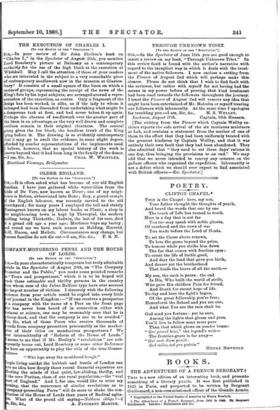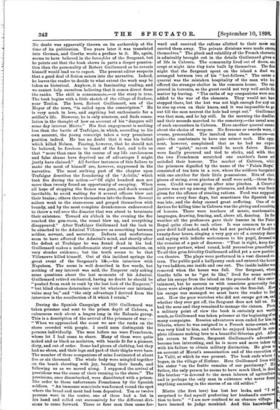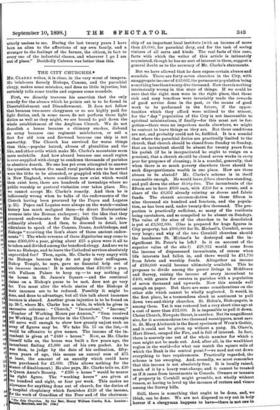BOOKS.
THE ADVENTURES OF A FRENCH SERGEANT.t THIS is a new edition of an interesting book, and presents something of a literary puzzle. It was first published in 1825 in Paris, and purported to be written by Sergeant Guillemard, a non-commissioned officer of the Grande-Armee.
• Copyrighted in the United States of America by Henry Newbolt.
[ The Adventures of a French Sergeant, from 1806 Li. 191111. By Baran* Gaillemard. London: lintehineon and Co. No doubt was apparently thrown on its authorship at the time of its publication. Two years later it was translated into German, and Goethe wrote a preface to it. He, again, seems to have believed in the bona-fides of the Sergeant, but he points out that the book shows in parts a deeper penetra- tion than the personality of Robert Guillemard as he reveals himself would lead us to expect. The present editor suspects that a good deal of fiction enters into the narrative. Indeed, he leaves the reader to decide to what extent the work may be taken as historical. Anyhow, it is fascinating reading, and we cannot help ourselves believing that it comes direct from the ranks. The skill is consummate,—or the story is true. The book begins with a little sketch of the village of Sixfour, near Toulon. The hero, Robert Guillemard, son of the Mayor of the town, "is called upon the conscription." He is very much in love, and anything but enthusiastic for a soldier's life. However, be is only nineteen, and finds conso- lation in the thought of how an account of his "dangers will some day interest Miette." His first engagement is nothing less than the battle of Trafalgar, in which, according to his own account, the young conscript takes a very prominent position indeed. He has no doubt that it was his bullet which killed Nelson. Fearing, however, that he should not be believed, he forebore to boast of the fact, and tells us that "more than once in the course of my life carelessness and false shame have deprived me of advantages I might justly have claimed." All further instances of this failure to make the most of himself are, however, suppressed in the narrative. The most striking part of the chapter upon Trafalgar describes the foundering of the 'Achille,' which took fire during the action :—" Of eight hundred men not more than twenty found an opportunity of escaping. When all hope of stopping the flames was gone, and death seemed inevitable, to avoid waiting for it several officers blew out their brains ; others threw themselves into the flames. Several sailors went to the store-room and gorged themselves with brandy, and by the most complete drunkenness endeavoured to throw a veil over the disaster that was about to terminate their existence. Toward six o'clock in the evening the fire reached the gun-room, the vessel blew up, and everything disappeared." After Trafalgar Guillemard had the luck to be attached to the Admiral -Villeneuve as something between soldier, servant, and secretary. Defeats and misfortunes seem to have affected the Admiral's mind, and shortly after the defeat at Trafalgar he was found dead in his bed. Guillemard makes a melodramatic story of assassination, on very Blender evidence ; but the truth seems to be that Villeneuve killed himself. Out of this incident springs the great event of the Sergeant's life,—his interview with Napoleon. The scene is well described in few words, but nothing of any interest was said, the Emperor only asking some questions about the last moments of his Admiral. Guillemard retired enchanted, having no doubt he should be
pushed from rank to rank by the last look of the Emperor," "but blind chance determines our lot whatever our intrinsic value may be," and "the only advantage I derived from the interview is the recollection of it which I retain."
During the Spanish Campaign of 1810 Guillemard was taken prisoner and sent to the prison depot of Cabrera, a calcareous rock about a league long in the Balearic group. This is a description of the arrival of the prisoners of war :— " When we approached the coast we saw the rocks on the shore crowded with people. I could soon distinguish the persons individually. The men before me were Frenchmen, whose lot I had come to share. Many of them were quite naked and as black as mulattos, with beards fit for a pioneer, dirty, and out of order. Some had pieces of clothing, but they had no shoes, and their legs and part of their thighs were bare. The number of these companions of mine I estimated at about five or six thousand. The whole body were mingled together on the beach shouting with joy, beating their hands, and following us as we moved along. I supposed the arrival of provisions was the cause of their running to the shore." The provisions, once disembarked, were distributed with a prison. like order to these unfortunate Frenchmen by the Spanish soldiers. "An immense semicircle was formed round the spot where the bread and meat had been deposited. Ten or twelve persons were in the centre, one of them had a list in his hand and called out successively for the different divi- sions to come forward. Three or four men then came for- ward and received the rations allotted to their mess an carried them away. The private divisions were made motif themselves." The pluck and volatility of the French charade is admirably brought out in the details Guillemard gives n of life in Cabrera. The community lived out of doors, an crept at night into tiny huts built by themselves. Tie firs night that the Sergeant spent on the island a duel wa arranged between two of his "hut-fellows." The cause o quarrel was the mistaken hospitality of the man who hal offered the stranger shelter in the common house. The rah poured in torrents, so the guest could not very well settle th matter by leaving. "The oaths of my companions were soot added to the war of the elements. They would no have stopped there, but the hut was not high enough for stay on to rise up even on their knees, and it was impossible to ge out till the man nearest the hole had crept out." Gnillemari was that man, and he lay still. In the morning the duellist and their seconds marched to the cemetery,—the usual seen of such encounters in Cabrera. Here another quarrel ensu0 about the choice of weapons. No firearms or swords were, d course, procurable. The insulted man chose scissors—on pair—the combatants to have one scissor each. His opp). nent, however, complained that as he had no experi. ence of "point," razors would be much fairer. Razois were finally procured and tied to sticks, and with that the two Frenchmen scratched one another's faces and satisfied their honour. The market of Cabrera, which the prisoners dignified by the name of the " Palais Royal," consisted of ten huts in a row, where the soldiers bargained with one another for their little possessions. Bits of clots, pieces of string, even pinches of snuff were sold,—three fora sous. Credit was not given after nine pinches. A Court of justice was set up among the prisoners, and death was freely given for the offence of stealing rations. Food was supposed to arrive every four days, but sometimes the Spanish boat was late, and the delay caused great suffering. One of the devices for killing time in Cabrera was the giving and receiving of lessons. There were teachers of music, mathematics, languages, drawing, fencing, and, above all, dancing. In fine weather all the professors gave their lessons in the Palais Royal quite close to each other. It was common to see a poor devil half naked, and who had not partaken of food for twenty-four hours, singing a very gay air of a country dance and saying with infinite seriousness to his pupil, dressed in the remains of a pair of drawers : "That is right, keep time with your partner, wheel round, hold yourselves gracefully." To all this grim frivolity Guillemard added yet a new pastime, —a theatre. The plays were performed in a vast disused cis- tern. The public paid a halfpenny each and entered the house by two ladders, one inside and one out. The inside ladder was removed when the house was full. Our Sergeant, whom Goethe tells us he "got to like," lived for some months after his escape from the island on the proceeds of this enter- tainment, but he assures us with conscious generosity th there were always about twenty people on the free-list. Hu his escape was managed we must leave the reader to fin out. How the poor wretches who did not escape got cal, as whether they ever got off, the Sergeant does not tell us. H had the sons and they remained to manage the cistern. Fro a military point of view the book is certainly not wort much, as Guillemard was taken prisoner at the beginning of s many campaigns. Russian adventures soon ended for him Siberia, where he was assigned to a French mine-owner, wh was very kind to him, and where he enjoyed himself in cum plete idleness making love to a beautiful Siberian girl. Afte his return to France, Sergeant Guillemard's adventur become less interesting, and he is more and more taken with his failure to obtain military distinction. He gives u an account of Murat's assassination and of the execution o La Valle, at which he was present. The book ends where began, in the village of Sixfour. Here Guillemard lives ws his sister "on the feeble remains of our patrimony." H father, the only person he seems to have much liked, is des His brother "is devoted to the mean labours of agricultu and is perhaps the only man in existence who never fo anything amusing in the stories of an old soldier."
Miette (the first love) has lost her looks, and "I surprised to find myself preferring her husband's conve tion to hers." "I am now confined to an obscure village. have learned to judge mankind. And this knowledge utterly useless to me. During the last twenty years I have been an alien to the affections of my own family, and a stranger to the feelings of the farmer, the citizen, in fact to every one of the industrial classes, and wherever I go I am out a place." Decidedly Cabrera was better than this.




































 Previous page
Previous page